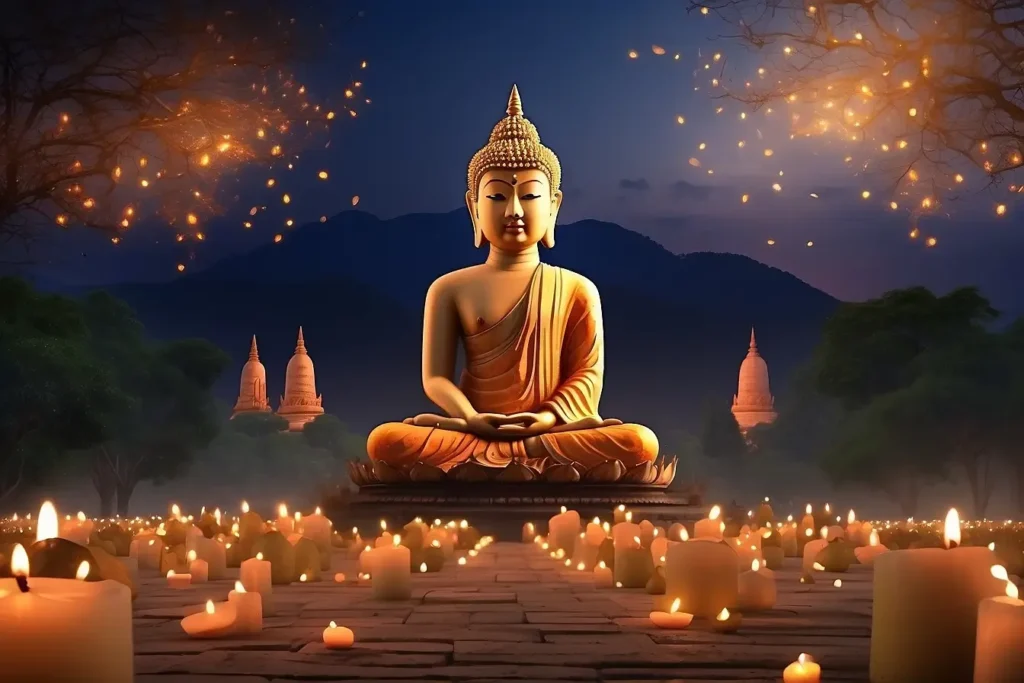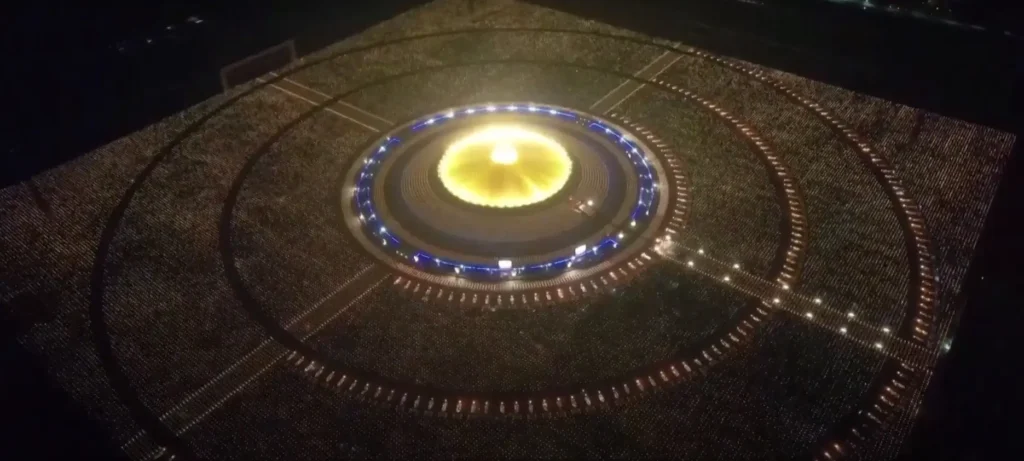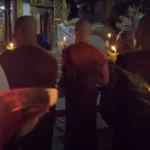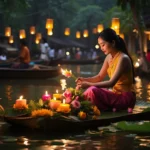If you are a devoted follower of Thai Buddhism, you might already know about the importance of Makha Bucha Day. This event, held in February or March, is highly revered in Thailand.
It commemorates the day when 1,250 disciples gathered to listen to the Buddha’s teachings without any prior invitation. On this special day, you can witness the gathering of the Sangha, pay respect at the temple, and take part in acts of doing good deeds.
The candlelit procession and spiritual practices of this national holiday provide a deeply moving experience for those seeking a stronger connection with Thai Buddhism.
Facts About The Makha Bucha Day Festival
| Facts | Explanation |
|---|---|
| Name of the Festival | Makha Bucha Day |
| Type of Festival | Buddhist religious festival |
| City of Origin | Nakhon Ratchasima (also known as Korat) |
| Festival Etymology | “Makha” refers to the third lunar month, and “Bucha” means to honor or venerate |
| Date when it was celebrated first | First celebrated in 1980 |
| Founder of the Festival | The festival was established by the Thai government |
| Brief History of the Festival | – Makha Bucha Day commemorates the spontaneous gathering of 1,250 enlightened monks to hear the Buddha preach. – It is a day of merit-making, with Buddhists visiting temples for candlelit processions and meditation. |
| Brief History of the City | – Nakhon Ratchasima is one of the oldest cities in Thailand, with a rich history dating back to the Dvaravati period. – It has been an important center for trade and agriculture, and it played a significant role in Thai history, particularly during the struggle for independence. |
| Ethnic Information | The city is predominantly inhabited by Thai people, with a mix of various ethnic groups from the northeastern region of Thailand. |
| Location of the City in the Country | Nakhon Ratchasima is located in the northeastern region of Thailand. |
| How to Reach the City | The city can be reached by train, bus, or car. The nearest airport is Nakhon Ratchasima Airport. |
| Nearby and Surrounding Cities or Towns | – Korat (short for Nakhon Ratchasima) is the largest city in the region. – Khon Kaen, approximately 200 kilometers away. – Udon Thani, around 300 kilometers from Nakhon Ratchasima. |
| Google Map Link to City Location | Nakhon Ratchasima on Google Maps |
| Festival Main Events and Activities | – Candlelit processions at Buddhist temples. – Alms given to monks. – Meditation and prayers. |
| Other Famous Tourist Attractions | – Phimai Historical Park: An ancient Khmer temple complex. – Thao Suranari Monument: Commemorates the city’s heroine. |
| Famous Food Dishes of the City | – Songkran Festival: The Thai New Year is celebrated in mid-April, often with water-related festivities. – Loy Krathong: A festival of lights where people float decorated baskets on water to pay respects to the water spirits. |
| Landmarks in the City | – The Thao Suranari Monument: Honoring the city’s heroine, Thao Suranari. – Wat Sala Loi: A beautiful temple known for its unique architecture. |
| Related Festivals | – Songkran Festival: The Thai New Year is celebrated in mid-April, often with water-related festivities. – Loy Krathong: A festival of lights where people float decorated baskets on water to pay respects to the water spirits. |
Historical Significance
Makha Bucha Day is a significant Buddhist holiday celebrated in several Southeast Asian countries, including Thailand, Cambodia, and Laos. This annual observance commemorates a pivotal event in the life of the Buddha and holds great historical and spiritual significance.
According to Buddhist tradition, Makha Bucha Day marks the day when over 1,250 enlightened disciples spontaneously gathered to pay homage to the Buddha. This extraordinary gathering took place on the full moon day of the third lunar month in the year 543 BCE.
The disciples had not been summoned or prearranged to meet; rather, they individually decided to come and pay their respects to the Buddha.
The event is believed to have occurred nine months after the Buddha’s enlightenment and nine months before his passing into final Nirvana. It exemplifies the spontaneous devotion and unity among the early followers of Buddhism, highlighting their unwavering commitment to the teachings of the Buddha.
On Makha Bucha Day, Buddhists participate in various religious activities to express their reverence and deepen their spiritual practice. They engage in merit-making acts such as offering alms to monks, attending temple ceremonies, and practicing meditation.
These practices aim to cultivate mindfulness, compassion, and self-reflection.
Origin of Makha Bucha Day
The origin of Makha Bucha Day can be traced back to an event that took place nine months after the enlightenment of the Buddha. On the full moon day of the third lunar month, 1,250 monks spontaneously gathered to hear the Buddha preach.
This event, known as the “Sangha Assembly,” was a pivotal moment in the early days of Buddhism and led to the establishment of the ethical code of conduct for monks.
Makha Bucha and Thai Buddhism
Makha Bucha Day is deeply intertwined with the spiritual practices of Thai Buddhism. It is a time for devout Buddhists to reflect on their spiritual journey, make merit, and engage in acts of generosity.
The candlelight procession, where you walk around the temple three times with a lit candle, is a powerful symbol of your commitment to the teachings of the Buddha and the pursuit of inner peace and enlightenment.
Religious Observance and Practices
Some of the most important aspects of Makha Bucha Day revolve around religious observance and practices that are central to Thai Buddhism. This includes morning alms merit-making temple visits, and the Sangha assembly, all of which hold significant spiritual significance for practitioners.
Morning Alms and Merit-Making
On Makha Bucha Day, you have the opportunity to participate in the traditional practice of giving alms to monks in the morning. This act of generosity is considered highly meritorious in Thai Buddhism, as it reflects your support for the monastic community and demonstrates your commitment to the teachings of the Buddha.
By making merit through acts of kindness and generosity, you can cultivate positive karmic energy that brings auspiciousness and blessings into your life.
Temple Visits and Sangha Assembly
Visiting a temple on Makha Bucha Day allows you to join the Sangha assembly in paying respects to the Triple Gem – the Buddha, the Dharma, and the Sangha. You can take part in religious ceremonies, listen to Dhamma talks, and make offerings to the monks as a sign of reverence and gratitude.
This collective act of devotion deepens your spiritual connection and strengthens your commitment to the path of ethical conduct, mental discipline, and wisdom taught by the Buddha.
Cultural Celebrations
However, Makha Bucha Day is not just a religious event but also a cultural celebration in Thailand. The day is marked with various activities and events that showcase the rich traditions and customs of Thai Buddhism.
It is a time when people gather to pay respects to their ancestors and engage in acts of generosity and kindness.
The Candlelight Procession

One of the most visually stunning and spiritually significant aspects of Makha Bucha Day is the candlelight procession. On the evening of the full moon, thousands of worshippers carry candles as they walk around the temple three times in a clockwise direction.
This dramatic display symbolizes the light of wisdom illuminating the darkness of ignorance and is a powerful reminder of the importance of mindfulness and enlightenment in one’s spiritual journey.
Other Festive Activities on Makha Bucha Day
Aside from the candlelight procession, Makha Bucha Day also features a wide range of other festive activities. These can include traditional Thai dance performances, live music, and cultural shows. You may also have the opportunity to witness colorful flower offerings and participate in meditation sessions led by Buddhist monks.
These activities not only add to the celebratory atmosphere but also provide an opportunity for you to immerse yourself in the traditions and customs of Thai Buddhism.
Makha Bucha Day in Contemporary Thailand
Lastly, let’s delve into how Makha Bucha Day is observed in present-day Thailand. This significant Buddhist holy day is deeply ingrained in the fabric of Thai society, combining traditional religious customs with modern cultural practices.
National Holiday and Public Observation
As a National Holiday, Makha Bucha Day is a time for both public and private observance. The entire country comes to a standstill as people honor this sacred occasion.
Banks, government offices, and many businesses close their doors, allowing individuals to participate in temple visits, religious ceremonies, and gatherings with family and friends.
Spiritual Practices and Community Involvement
Makha Bucha Day is a time for spiritual reflection and community involvement. Throughout Thailand, you’ll find people engaging in meditation, making merit at temples, and participating in candlelight processions.
This day offers an opportunity to strengthen your spiritual connection and take part in acts of kindness and generosity. The sense of community and shared purpose during Makha Bucha Day is truly uplifting, reminding you of the positive impact of spiritual practices on society.
Conclusion
Following this outline, you now have a better understanding of the significance and practices of the Makha Bucha Day Festival in Thailand. It is a deeply spiritual and important Buddhist holy day, celebrated with Sangha assemblies, temple visits, and religious observances such as merit-making and candlelight processions.
This festival is a National Holiday and an opportunity for Thai Buddhists to engage in spiritual practices and reflect on the teachings of Buddhism. It is a time for self-reflection and honoring the teachings of the Buddha.
As you celebrate this unique event, you will be able to witness the deep spiritual devotion and cultural significance that Makha Bucha Day holds for the Thai people.



